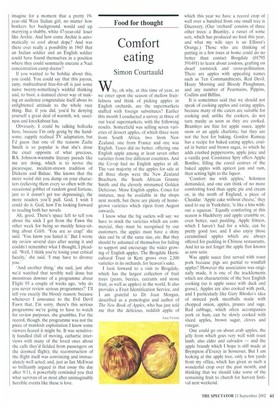Comfort eating
Simon Courtauld
Why, oh why, at this time of year, as we enter upon the season of mellow fruitfulness and think of picking apples in English orchards, are the supermarkets stuffed with foreign substitutes? Earlier this month I conducted a survey at three of our local supermarkets, with the following results. Somerfield was selling seven varieties of dessert apples, of which three were from South Africa, two from New Zealand, one from France and one was English. Tesco did no better, offering one English apple among at least seven other varieties from five different countries. And the Co-op had no English apples at all. The vast majority of the apples for sale at all three shops were the New Zealand Braeburn, the South African Granny Smith and the cleverly misnamed Golden Delicious. More English apples, Coxes for instance, may be available in the shops next month, but there are plenty of homegrown varieties which ripen from August onwards.
I know what the big outlets will say: we have to stock the varieties which are commercial, they must be recognised by our customers, the apples must have a shiny skin and be of the same size, etc. But they should be ashamed of themselves for failing to support and encourage the wider growing of English apples. The Brogdale Horticultural Trust in Kent grows over 2,300 varieties in its orchards, for heaven's sake.
I look forward to a visit to Brogdale, which has the largest collection of fruit trees (pears, berries, currants and stone fruit, as well as apples) in the world. It also provides a Fruit Identification Service, and I am grateful to Dr Joan Morgan, described as a pomologist and author of The New Book of Apples, who has just told me that the delicious, reddish apple of which this year we have a record crop of well over a hundred from one small tree is Discovery. (Our 'orchard' consists of three other trees: a Bramley, a russet of some sort, which has produced no fruit this year, and what my wife says is an Ellison's Orange.) Those who are thinking of putting in a few trees at home could do no better than contact Brogdale (01795 591491) to learn about cordons, grafting on dwarf rootstock and cross-pollination. There are apples with appealing names such as Ten Commandments, Red Devil, Hoary Morning and Bloody Ploughman, and any number of Pearmains, Pippins, Codlins and Biffins.
It is sometimes said that we should not speak of cooking apples and eating apples, because many of the eaters are suitable for cooking and, unlike the cookers, do not turn mushy as soon as they are cooked. Bramleys are fine for apple sauce, apple snow or an apple charlotte, but they are not the best for baking. Gordon Ramsay has a recipe for baked eating apples, coated in butter and brown sugar, to which he adds crushed peppercorns, apple juice and a vanilla pod. Constance Spry offers Apple Bonfire, filling the cored centres of the baked apples with apricot jam and rum, then setting light to the liquor.
'Comfort me with apples,' Solomon demanded, and one can think of no more comforting food than apple pie and cream or. in the north of England, a piece of Cheddar. 'Apple cake without cheese,' they used to say in Yorkshire, 'is like a kiss without a squeeze.' Equally comforting at this season is blackberry and apple crumble or, even better, suet pudding. Apple fritters. which I haven't had for a while, can be pretty good too; and I also enjoy those caramelised apples which are always offered for pudding in Chinese restaurants. And let us not forget the apple flan known as torte tatin.
Was apple sauce first served with roast pork because pigs are partial to windfall apples? However the association was originally made, it is one of the tracklements which are characteristic of the best English cooking (so is apple sauce with duck and goose). Apples are also cooked with pork, and I particularly like Gary Rhodes's idea of minced pork meatballs made with chopped onion, apples, prunes and sage. Red cabbage, which often accompanies pork or ham, can be slowly cooked with sliced apples, brown sugar, cloves and vinegar.
One could go on about crab apples, the jelly from which goes very well with roast lamb, also cider and calvados — and the apple brandy which I hope is still made at Bi-ympton d'Evercy in Somerset. But I am looking at the apple tree, only a few yards from my office, which has given us such a wonderful crop over the past month, and thinking that we should take some of the remaining fruit to church for harvest festival next weekend.










































































 Previous page
Previous page